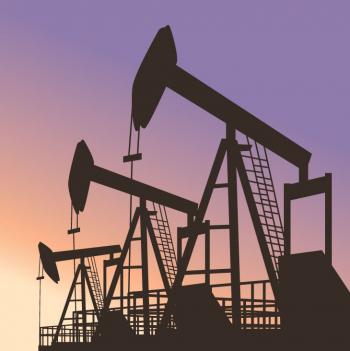
Job No. 1 for oilfield students: Get a job
They’ve been told to not worry — there will be jobs — but they worry anyway.
Andrews Owusu, of Ghana, a senior in petroleum engineering at the University of Louisiana at Lafayette, and Garrett Carter, a junior from Hattiesburg, Mississippi, are both feeling the pressure of an uncertain job market in the oil and gas business. They feel it with every unanswered letter or job application.
Owusu, who’s scheduled to graduate in May, and Carter, who held fond hopes for a summer internship, are coming up short of their goals thus far. Owusu has sent out numerous resumes and applications for petroleum engineering jobs, with mixed results. He wants to work in the U.S., and is cleared by the U.S. government to do so.
Carter has a job lined up in a Broussard shop, breaking down tools for the oil and gas business, but it’s a summer job, manual labor, not an engineering internship. At least, he said, it’s in an oil and gas related field.
“With falling oil prices, it’s hard to get interviews,” Owusu said. “I’ve sent out a lot of resumes and applications. Some call back, others don’t.”
“UL has a tradition of 100 percent placement,” said Fathi Boukadi, LAGCOE Endowed Professor of Petroleum Engineering, and petroleum engineering department head. “This year, most seniors have jobs. There’s no (hiring) freeze.”
He said that of 750 students in the engineering program, some 68-70 will graduate in May. Most have jobs now, he said, although some are sponsored by countries that sent them to school, like Saudi Arabia, Angola, Nigeria, Ghana. Companies hiring include big oil companies like Chevron; they also include some of the same companies laying off: Halliburton, Baker Hughes, Weatherford.
“It’s a blessing to be in the hub of the service industry,” he said. For graduates of other universities, those farther from the oil business, it will be “tougher” to find work.
Boukadi said alumni, too, have fared well during the recent, seven-month slide in oil and gas prices and during the massive layoffs announced by oil service giants. Through extensive contact with UL’s graduates, he has heard of only one or two UL-prepared engineers that have been laid off.
In fact, Boukadi said oil and gas industry downturns like this current one don’t threaten UL or its petroleum engineering graduates.
“Our students are high performers,” he said. “Look for low performers to be cut.”
The downturn that started in June, with Brent crude prices at $114 a barrel, and has continued into February, with prices below $50 a barrel, has spawned significant layoffs: Schlumberger, 9,000; Baker Hughes, 7,000; Weatherford, 8,000; Halliburton, 5,000. The downturn’s roots rest in increased production, especially by the U.S., and dwindling demand by China, India and Europe. It’s a market matter — supply and demand, Boukadi said.
Boukadi said he fully expects that demand will rebound in places like China and India, enough to outpace the supply. Oil will again pass the $100-a-barrel benchmark in 2016, he said, and keep drifting northward. Look for $200-a-barrel oil in 2025 to 2030, he said, for this reason: “Cheap oil,” the type that gushes from the dry earth, is vanishing.
To slake the global thirst for oil in the future, he said, explorers and producers will find themselves evermore dependent on “unconventional” oil, which depends upon more expensive means of producing a barrel of oil from harder-to-get-to places. Think horizontal drilling, hydraulic fracturing — “fracking.” Think drilling in the Arctic.
But Owusu and Carter don’t need economics lessons. They need jobs.
“I’m fairly worried about it,” Carter said. In the facing of mounting industry layoffs, his internship applications received little or no responses.
Owusu said he’s sending out applications even as friends in the industry are being laid off.
Both men got to UL by way of other universities: Owusu in Ghana, Carter in Mississippi. Both had family histories in oil and gas. Owusu’s cousins, Monica Adjei and Christian Toguem, graduated in engineering at UL and found work within the industry. Carter’s grandfather worked rigs; his uncle worked in tank cleaning and his father, who earned engineering degrees at Mississippi State and LSU, left school during the bitter downturn of the ‘80s, and had to scrape his way into the business.
Boukadi, though, maintains confidence that UL petroleum engineering graduates will find work, even in the face of an unfriendly economy. Yes, there have been layoffs. Yes, demand for oil has dropped along with the prices. Yes, exploration and production companies have trimmed their operating budget sails, at least for this year. But Boukadi said layoffs, for the most part, will occur among lower-skilled employees and people close to retirement — not engineers.
“The demand for engineers is always there,” he said. “You don’t build a hospital and not hire doctors.”
Owusu and Carter are banking on that. They’re drilling their way down the help-wanted lists, hoping their explorations will produce gainful employment. The former said he’s gone as far as Tennessee for one job fair, there’s one coming up in California. If there are no jobs, he may take four more geology classes, enough to give him a second major along with his petroleum engineering degree.
The latter said he’ll continue to search for opportunities on line. He’s worried, he said, but he has a little time.
“It’s another year until I graduate,” he said. “When the prices rise, there will be jobs for us.”
- Log in to post comments
